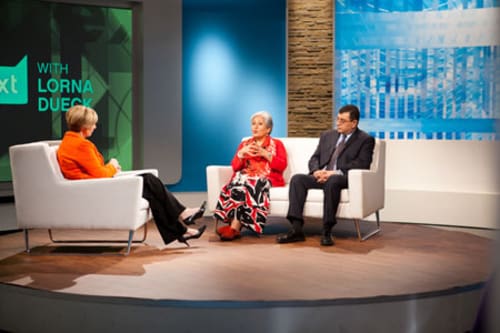Editor’s Note: We asked Stephen Lazarus, writer and researcher for CONTEXT with Lorna Dueck, to talk about the challenge of translation and production of unapologetically Christian television-journalism in a post-secular landscape. National broadcast times for CONTEXT are posted at http://www.contextwithlornadueck.com/airtimes-stations.
When you quit preaching to the choir, what comes next? How do you communicate the complexity (or simplicity) of the Christian faith and a Christian worldview to an increasingly secular, post-Christian audience that has its doubts about your “good news”? That’s part of our mission and challenge. CONTEXT is a current affairs television program now in its second season that airs on seven networks in Canada and the United States. Full episodes are available online. We look at the headlines and events of the day to ask questions and uncover where God may be at work in the world.
CONTEXT has a growing audience that includes many people with no particular faith connection, as well as many viewers who are Christians or members of other faith communities. For our very first program, “Can We Trust Religion?,” we commissioned an Ipsos Reid poll to learn more about our target audience. The results surprised us. CONTEXT and Ipsos Reid polled 1,100 Canadians about their attitudes toward religion, and about their own beliefs and practices. Here are some of those results:
47% said religion does more harm than good.
51% disagreed with the statement: “Religion is important to our moral lives.”
19% said they believed in Hell.
29% said they believed in Heaven.
53% responded that they believed in God.
64% believe that religion provides more questions than answers.
Even allowing for the fact that polling sometimes provides more of an impressionistic picture than a photographic representation of a subject, the results made us stop and think.
We can no longer assume that the broad public is familiar with the content of the Bible or God’s offer of salvation. And the problem is not just “biblical illiteracy.” It goes deeper. The transmission of information about the Bible or Christianity alone does not solve the problem. I have often wondered what unsuspecting people make of gospel tracts that are provided to them by anonymous Christians without any context or the promise of ongoing relationship. In a similar way, what people hear or imagine today when the word “God” is mentioned on TV without further detail may in fact bear little or no resemblance to the personal character of the God described in the Bible. About which God are we speaking? What is that God like? If the audience is unfamiliar with the character of Jesus or the God of the Bible, a more lengthy introduction is required. Such context can no longer be taken for granted, if it ever could. When so much has to be packaged into twenty-four minutes and reduced to sound bites, great care has to be shown to ensure that communication actually happens across the air waves. Communication involves not only what we intend, but what we say, and how that’s received.
If we are not careful, our “script” may intend one thing, stating a point clearly to us, but some members of our audience may hear something else. This is often preventable but it may sometimes be unavoidable. Every day we encounter the reality that different worldviews exist. The difference between sitting down for coffee and broadcasting into a couple of hundred thousand living rooms is that the opportunities for clarification and “hashing things out” and for viewers to ask, “Now what do you really mean by that?” are actually more limited.
In response, at CONTEXT we open multiple channels for viewer feedback via social media and also provide contact information for a personal liaison who can supply additional resources or talk through issues of faith with inquirers who want to connect. This challenge reminds us that television has remarkable strengths, but it can never replace the incarnated word-the word made flesh.
Producing a show inspired by Christian faith for a secular audience also confronts us with several contradictions. We assume there is a loving God who is active in the world who cares about everyone. Much of our audience, however, lives according to a very different story. The gospel in a nutshell-the biblical themes of the good creation and the character of God, the reality and heartbreak of sin, and the wonder of Christ’s offer of redemption-shape our lenses and camera angles as TV producers. Yet, most of our viewers have lost or never known the Bible’s grand plotline or its radical meaning for their lives. This means that as much as we need to understand the basics of a Christian worldview, we also have to be generous, inquisitive learners who try to grasp the basics of our audience’s worldviews as well. How do they see the world differently than Christians? Where are the points of contact and issues of common concern?
This confronts us with a sometimes daunting challenge of translation or cross-cultural interpretation within our own culture. It also means we have to watch our language. Religious jargon and Christian lingo-even carefully developed, good theology-falls on deaf ears. We are on guard that our native language and tacit knowledge of the faith can easily seem incomprehensible, like a strange and foreign tongue that does not always help us connect with viewers who do in fact carry around some big spiritual questions of their own. We hope to spark spiritual debate, and create a safe place for it. We accept that we may be misunderstood-and even vehemently disagreed with at times, but we aim for good reasons and not miscommunication to be the underlying cause. So we pray for the Holy Spirit to bridge the division and make our words seem more than babble (or Babel). We pray for illumination and conversion.
We are also aware that Christianity has a serious image problem in North American culture. It is too often perceived as angry, naive, and intolerant. Television, of course, is all about image. With forty episodes of CONTEXT each season, we try to find some fresh and interesting ways to challenge popular misperceptions and distortions of Christian faith.
 |
In one show this season we attempted to engage the secular perception that religion is humourless and dour. We asked whether God (or Christians) had a sense of humour. In our show, “Why Isn’t God Funny?,” we featured Royal Canadian Air Farce comedian Don Ferguson and a Jesuit priest and chaplain to the Colbert Report, Father James Martin, discussing the link between humour and spirituality. Both Ferguson, the Canadian comic, and Martin, the Jesuit priest, told jokes and stories and reminded the audience that holiness, happiness, and humour are not as far apart as many assume. To keep the conversation going, we also offered copies of Martin’s book Between Heaven and Mirth: Why Joy, Humor and Laughter are at the Heart of the Spiritual Life.
CONTEXT challenges the idea that Christianity is just about following the rules or being perfect-or being conservative or liberal. We humbly suggest to a secular audience and to Christians that God is much bigger and the Christian story of surrendering to God’s love is much better and more beautiful than many of us have ever been told.
Another recent show challenged the secular belief that religion and Christianity are inherently violent or dangerous. Yale theologian and author of A Public Faith, Miroslav Volf, helped viewers understand that violent expressions of faith happens when religion malfunctions. He suggested that the antidote to violent religion is more faith, not less. When believers go deeper into their respective faiths, and when Christians encounter Jesus’s call to be peacemakers, faith can no longer be reduced to a political tool or marker of identity, as it was in the former Yugoslavia, for example. Volf explained how God can be used to justify violence only when the fullness of faith becomes hijacked to be used for unfaithful ends. In another segment that show, “When Faith Turns Violent,” we featured Nate Phelps, son of the controversial “God-Hates-Fags” preacher, Fred Phelps, sharing how the toxic fundamentalism of his childhood upbringing sent him into the arms of the atheism he advocates today.
How do we communicate the richness and hope of the Christian worldview to a secular audience via sound bites? Here are a few conclusions I am reaching after many shows:
- Feature topics and guests that engage a broad and religiously diverse audience.
- Tell good stories that show how surrendering to Jesus changes lives.
- Unleash an authentic Christian voice in the personality of a host who can be “religiously bilingual”-integrally Christian in perspective, yet taking the side of secular seekers and asking their questions of guests who can offer Christian wisdom in a compelling way.
- Don’t forget the power of visuals. Paint the picture, don’t just tell the story.
- Pose and seek to answer the burning questions on the secular mind with the resources of 2,000 years of Christian thought.
- Be implicit. As Saint Francis admonished, “Preach the gospel at all times, and when necessary, use words.”
- Be explicit. This is television, so use words. Just make sure they communicate the gospel.
- Remember that worldviews matter. Investigate the audience’s worldview for points of conflict and contact with your own.
- Remember that, “In Christ we live and move and have our being.” No terrain is foreign to Him, but pray that His Kingdom would come and his will would be done, on TV as it is in heaven.
- Recognize and relish your limitations. Twenty-four minutes can only contain so much. Secular seekers searching for God need more than television; they need connections to a Christian community where they can find answers and see faith and questions lived in 3-D with love, sacrifice, and grace.


